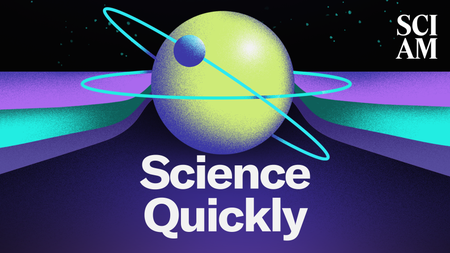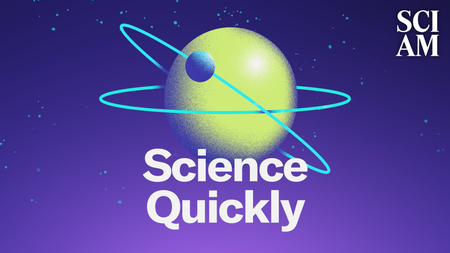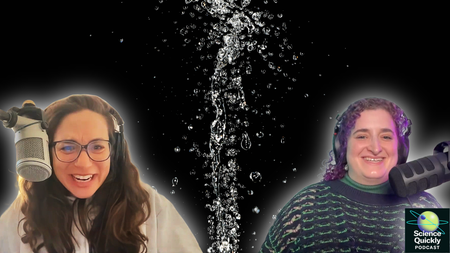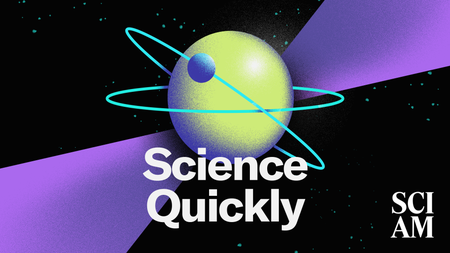
American Lifespans, Monkeys That Yodel, Measles, and More
States sue HHS for public health cuts, measles cases continue to rise, and a study finds Americans live shorter lives compared with their European counterparts.
Fonda Mwangi is a multimedia editor at Scientific American. She previously worked as an audio producer at Axios, The Recount and WTOP News. She holds a master’s degree in journalism and public affairs from American University in Washington, D.C.

American Lifespans, Monkeys That Yodel, Measles, and More
States sue HHS for public health cuts, measles cases continue to rise, and a study finds Americans live shorter lives compared with their European counterparts.

Losing USAID’s Public Health Programs Imperils the World
USAID is responsible for global health efforts that have saved the lives of millions of children. What happens when those programs are cut?

Unpacking the Mystery of Squirting: What Science Really Says
A mysterious and often debated aspect of human sexuality colloquially known as “squirting” sparks controversy. This episode explores what research reveals.

Shark Sounds, Molecules on Mars and Continued Federal Cuts
Cuts to federal health and science agencies continue. Plus, we discuss the sounds of sharks, the meaning of Martian molecules and one big dino claw.

Invasive Plants Are Not the Enemy
Botanist Mason Heberling challenges how we think about invasive species and our role in their spread.

NASA Astronauts Finally Return, Seals Hold Their Breath, and Penguin Poop Stresses Out Krill
In this week’s news roundup, two NASA astronauts finally return to Earth after nine unexpected months in space, gray seals hold their breath for more than an hour, and penguin poop panics krill.

The Neurosurgeon Who Advised Severance Breaks Down Its Science
A neurosurgeon who has acted as a consultant for Severance explains the science behind the show’s brain-altering procedure—and whether it could ever become reality.

Debunking Colonoscopy Myths That Could Be Putting Your Health at Risk
A colonoscopy can save your life, but misinformation keeps many people from getting one. A gastroenterologist sets the record straight.

New NASA Missions, Bonus Moons for Saturn and Whale Urine That Balances Ocean Chemistry
The EPA rolls back regulations, NASA launches two exciting missions, and we discuss the surprising way whale urine moves nitrogen across the ocean.

Robotics Researchers Bring The Electric State’s Cosmo to Life
A robotics researcher takes on the Russo brothers’ vision from the new movie The Electric State.

On COVID’s Fifth Anniversary, the U.S. Remains Vulnerable to Infectious Disease
On COVID’s fifth anniversary, the U.S. is facing an outbreak of tuberculosis in Kansas that makes strong public health systems as important as ever.

Measles Misinformation Sparks Concern, Supreme Court Weakens EPA, and Scientists Engineer Woolly Mice
In this week's news roundup, we dig into measles misinformation, ozone recovery and new findings on using nasal cartilage to treat knee injuries.

Author John Green on How Tuberculosis Shaped Our Modern World
Novelist John Green talks about his new nonfiction book, Everything is Tuberculosis, and the inequities in treatment for the highly infectious disease.

How Plastics in the Brain Connect to the Wider Debate over Petroleum
Many people are concerned about microplastics reaching our brain—but few realize how this connects with petroleum production and the climate crisis

The Latest on Measles in the U.S, a Mystery Illness in the DRC and the Flu Vaccines
In this news roundup, we cover outbreak updates, microbes in space and a brain turned to glass.

Why You Can’t Get That Song Out of Your Head
Some songs get stuck in our head more than others, and scientists have uncovered what makes them so irresistible.

Measles Outbreaks, Asteroid Risks and Fish Friends
In this week’s news roundup, we cover activity from the black hole at our galaxy’s center and a troubling measles outbreak in Texas.

The Air around Us Is Full of Life
Journalist Carl Zimmer chats about aerobiology and his new book Air-Borne: The Hidden History of the Life We Breathe.

Love Isn’t Just about Romance. Here’s How Nonromantic Bonds Shape Our Lives
Valentine’s Day often focuses on romance, but deep friendships deserve love, too. Here’s why they matter.

What We’ve Learned about Superstrong Shrimp, How Deep Canyons Formed on the Moon, and What Bonobos Know
In this week’s roundup, we’re reviewing some animal research, the latest on bird flu and the burden of microplastics on our brain.

Funding Freeze and Communications Hold Create Confusion for U.S. Researchers
Researchers in the U.S. are grappling with Trump administration executive orders around health and science agency funding and communications.

Avoiding Outrage Fatigue while Staying Informed
Outrage fatigue can wear us down—but we can take care of ourselves in an onslaught of overwhelming news.

Can Hopeful Skepticism Replace Harmful Cynicism?
Giving in to cynicism makes us less trusting, less connected, and even less physically and mentally healthy.

Why 2025 Is an Exciting Year in Heliophysics
From space weather to science missions, there’s a lot to be excited about in heliophysics this year.